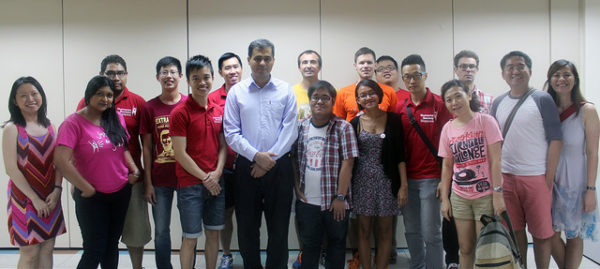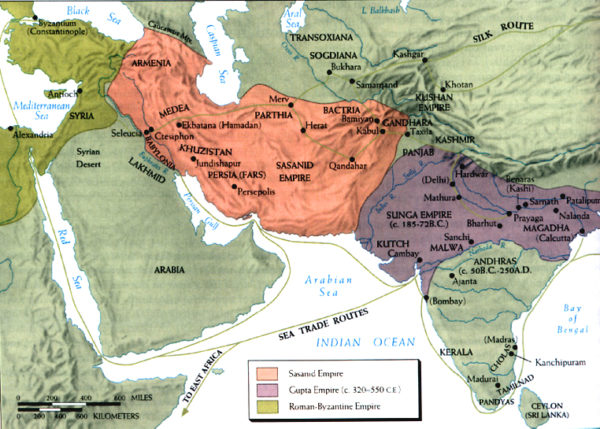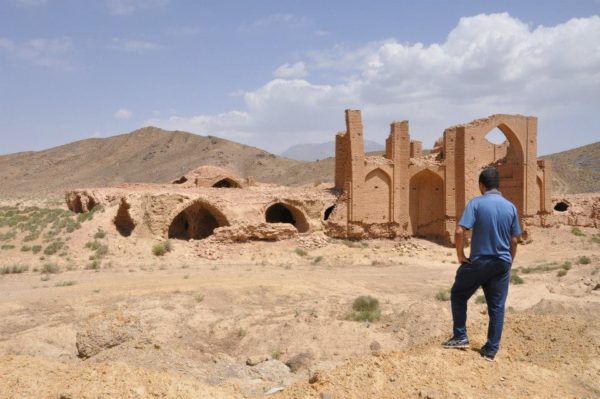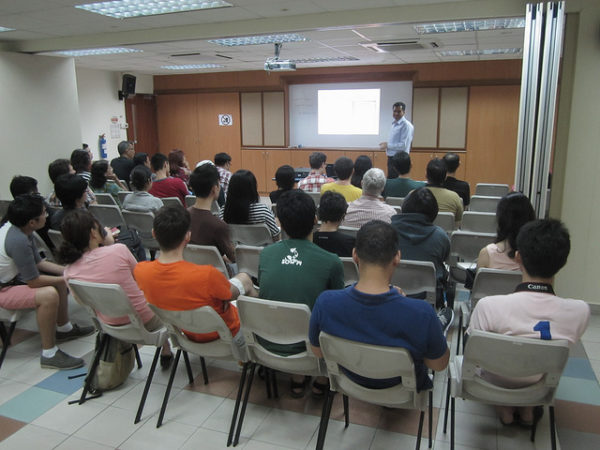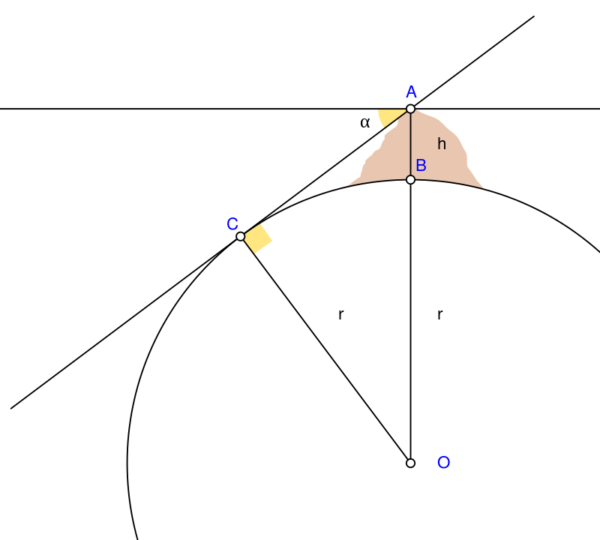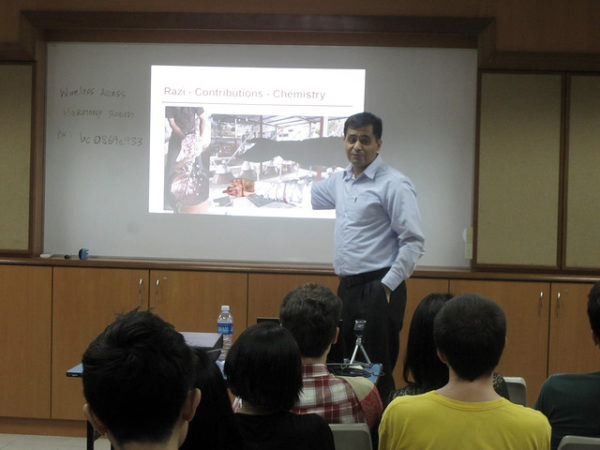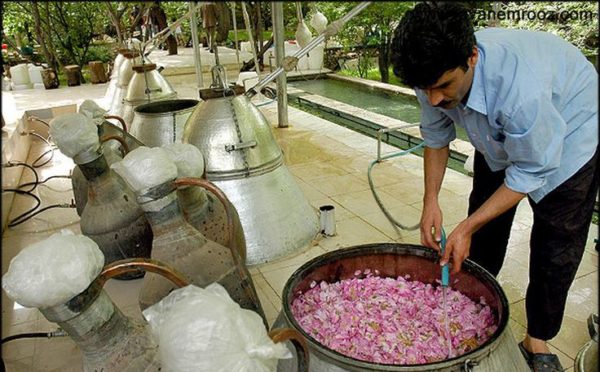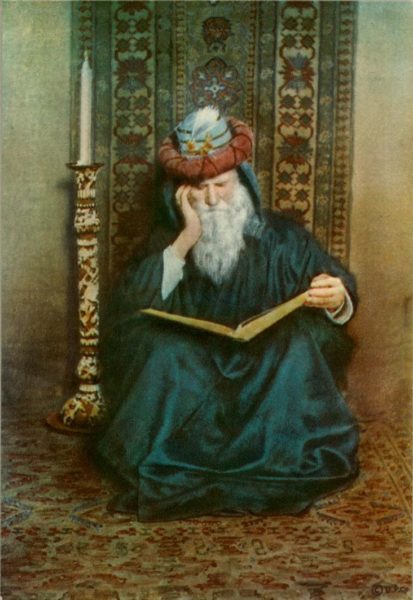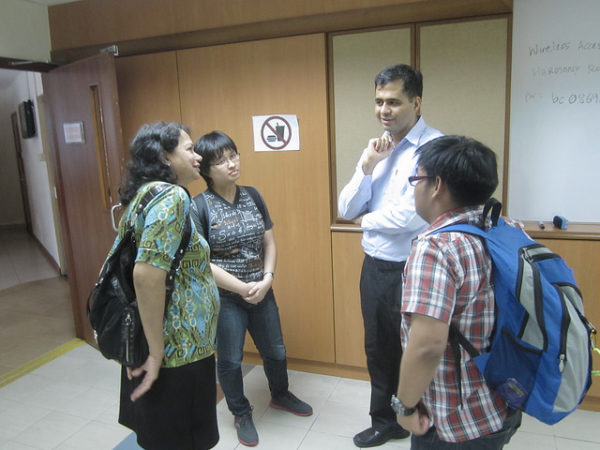This is a summary of a talk given by Hossein Roshandel on 30 November, 2014, on the Islamic Golden Age and its contributions to science and philosophy, at the invitation of Humanist Society (Singapore). Mr. Roshandel is an Iranian and a Postgraduate Student in School of Civil & Environmental Engineering, Nanyang Technological University since Jan 2012. The event was held at OnePeople.SG.
Hossein started his presentation with a basic introduction about the Middle East region. The “golden age” of Islam, remembered for its great accomplishments in science and innovation, is roughly defined as the era between two major invasions, the Arab conquest of Persia in the 651 and the Mongol sacking of Baghdad in 1258. The period also coincided with the Middle Ages in Europe. Many of the great thinkers in the Islamic world at that time were in fact Persians using the Arabic language to write their works.
Why is it important to talk about this golden age of Islam, despite its existence so many centuries ago? Hossein said that many muslims, including his friends in Iran, dream about reviving this “golden age” to allow Islam to be dominant religion on the planet again. However, one of the first things done in the name of this “revival” was to implement criminal sharia law that can involve punishments like the chopping off of hands for petty crimes such as theft. Hossein said if one does not understand this “golden age” properly, one can be easily convinced that such penalties are necessary in the first place. In addition, many terrorist groups also justified their atrocities in the name of reviving this “golden age”.
The roots of this golden age predates Islam. In Sassanid Persia, despite the existence of castes that limited people’s educational opportunities, the Sassanids already had hospitals and seminaries that eventually contributed to the golden age. One famous example is the intellectual centre of Gondēshāpūr, survived as ruins 14km southeast of Hossein’s hometown, Dezful in Southwest Iran. Under the protection of Sassanids, Greek philosophers and Christian Nestorian Assyrians fleeing Byzantine religious prosecution translated many works on medicine and astronomy into the Persian language.
After the Arab conquest of Persia, Persians and non-muslims were second-class citizens for a while. However, many also picked up Arabic and attempted to work with their new masters. Arab rule, however, got rid of the Sassanid class system and provided education to the common folk. Nonetheless, the golden age took a while to emerge. It was only after the establishment of the Abbasid caliphate did the Persians receive more respect from their Arab rulers. Intellectual development started to flourish. The Abbasid also wanted to reduce dependence on the Greeks as a source of physicians. Thus, they started funding translation of Persian works in Arabic and this extended into poems and mathematical works. In fact, some Persian books were preserved in the Arabic form after the original copies were lost. The Arabic version was then translated back to Persian in the modern era.
Picture above: Ruins of an old caravansai in Iran, a resting place for ancient trade caravans passing through Iran.
Persia occupied a strategic position along the Silk Road and this contributed to the golden age too. Persia is located between China and Europe. Any trader travelling between these two regions must pass through Persia, making Persia a crossroad of civilisations just like Singapore today. Trade brought along advancements such as paper and gunpowder. Combined with the translated works, there were vibrant intellectual debates in the Islamic world.
The translations were not perfect. There were some cultural misunderstandings. Sometimes, entertainment works from Greece such as tragedies and comedies were translated and used as serious philosophy and logic works. But overall, science and philosophy flourished. Many thinkers were paid just to think and teach. Conflicts between faith and science were already present in the golden age. For example, there are verses in the Koran stating that the Earth was flat. However, there were already Greco-Roman works that argued that the world is round. Efforts were made to reconcile that. For example, some scholars argued that the Earth was huge if there is a small patch on its surface, it will appear flat. Thus in a sense, the Koran was right.
Overall, Hossein said the Abbasid caliphs were tolerant of interfaith dialogue, allowing debates between muslims, jews and even atheists. Scholars who were debating with muslims in the Abbasid court were protected from prosecution. This is in big contrast to countries like Saudi Arabia today, where atheists will be punished for criticising Islam.
Al-Biruni
Hossein then proceeded to discuss some famous thinkers and discoveries during that era. There were many words in English today that have Arabic roots. For example, the word Algorithm is derived from the famous Persian mathematician al-Khwarizmi who was born in Khwarezm, partly located in modern day Uzbekistan. al-Khwarizmi’s latin name is Algoritmi, leading to the word algorism and algorithm we see today. Another famous word with Arabic roots is Algebra, having roots in “al-jabr” meaning “reunion of broken parts”.
Hossein then talked extensively about Al-Biruni, an Iranian polymath who studied physics, mathematics, astronomy, and natural sciences. Al-Biruni was also famous for his scholarly work documenting the life in 11th century India, especially the life and beliefs of Hindus. Al-Biruni was very interested in comparative religion. He was a pioneer in studying Zoroastrianism, Judaism, Hinduism, Christianity, Buddhism, Islam, and other religions, treating them objectively and trying to understand them instead of proving them wrong. In contrast, Hossein said that many scholars in Iranian seminaries today are only familiar with their own religion.
Hossein recalled a funny story where Biruni wanted to test the widespread belief that diamonds are poisonous. He fed a dog with a diamond and noticed that the dog survived. Biruni’s willingness to sacrifice a diamond for scientific knowledge was a remarkable contrast to the close-mindedness of some people today, said Hossein, adding Biruni also devised ways to measure the radius of the Earth. He was at a mountain in India and he used an an astrolabe and the law of sines formula and successfully measured the radius of Earth (6,339.9 km) which has an error of less than 1 percent (0.0026%). The actual radius as we know today is 6,356.7 km.
Razi
Hossein went on to talk about the origins of the word “chemistry”, which came from the world alchemy and the Arabic root word al-kīmiyā’ (الكيمياء). The word kimiya was in turn a Persian word for “kimiya”, the elixir believed to turn copper into gold. One major contributor to the field of chemistry is Muhammad ibn Zakariya al-Razi, or just “Razi” for short. Hossein said Razi worked for a while as a goldsmith and wanted find cheap gold.
Razi was born near Tehran and later moved to Baghdad for his studies. Many good hospitals, schools and libraries were already established in Baghdad. Razi studied medicine at the city and subsequently returned to Tehran, serving at a hospital there. Razi was said to be very generous, treating many poor people for free although people started gossiping and speculating whether Razi found the secrets of Alchemy and is obtaining great wealth from it. Razi was a pioneer in medical ethics and he wrote that physicians should not do harm even to their enemies. In a sense, Razi was a humanist who is willing to help anyone regardless of their religious label.
Razi was also well known for his work on humors and for creating a medical manual for the ordinary people to do self-medication that helped to promote public health. Razi also created pharmaceutical apparatus that were still in use hundreds of years after his death. However, Razi also had some funny ideas. For example, he believed that mental illness were caused by possession by demons. Hossein said while we can regard the scholars in the golden age as geniuses, it doesn’t mean everything they believed was right.
Razi is known to have perfect the distillation process in chemistry. In Iran, there is a traditional rose festival in May where people collect rose petals, heat it up, distill them and collect the rose water. What happens when you put wine instead of rose water? You end up with alcohol. This is supposingly how Razi discovered alcohol, said Hossein. Razi was also known to be the first one to synthesize acids such as phosphoric acid.
Razi was known as an agnostic atheist and didn’t believe that God created the world and interfered in it. Razi believed that all matter was already existing and God, if he existed, rearranged the existing matter and created the world. Razi also criticised the anger shown by religious people when faced by criticism. Razi believed in discussion, and not violence, with intellectual opponents. He also criticised the purpose of a prophet to spread the word of God. Despite all Razi said, he lived peacefully in the golden age and even muslims regarded him as one of the great thinkers of that era. Hossein said that people must understand the non-muslims also contributed to the golden age.
Avicenna
Hossein talked about his high school friend Ali who is currently a doctor in Iran. Ali told him about the troubles left behind by the golden age. For example, there are patients who refused to undergo cancer treatment because they wanted to try traditional persian medicine. While the golden age produced great medical scholars such as Avicenna, some of their works were nonsense, said Hossein. However, many people in Iran nowadays still respect Avicenna and believe everything he wrote is true.
For example, Avicenna suggested killing a snake using a human saliva (since the snake’s saliva / venom will kill a human). However, this is nonsense. However, it is very hard for Avicenna’s fans today to accept that he could be wrong. Avicenna is still very famous in Iran and even the Iranian post office printed stamps with his face on it. Iranian schoolchildren were also taught that Avicenna’ was a devout muslim, going to mosques whenever he has problems. But this wasn’t the only side of the story. Avicenna was also very hardworking, working late into the night. Once, he was feeling sleepy and he drinking wine to stay more energetic. However, Hossein said that in Sharia law, the punishments for drinking wine is severe. (Eg. dozens of lashes). And yet that people thought that by implementing all the harsh Sharia laws, like beheading and chopping of hands, they can bring back the Avicenna’s era. This is contradictory.
Omar Khayyám
The third and final thinker that Hossein described in detail was Omar Khayyám, a Persian mathematician, astronomer, philosopher, and poet. Khayyám is Hossein’s favourite and is also openly an atheist. Khayyám tried to write his arguments in the form of poems, such as arguing against the idea of afterlife in the The Rubáiyát of Omar Khayyám.
In this poem, which has several translations online, Khayyám argues that life is sweet and you should enjoy it to the fullest just like cash at hand, instead of thinking about afterlife, which you hear like a drum from afar. Hossein added that perhaps extremists should be told that they shouldn’t blow up themselves just for better afterlife, in case there is nothing over there at all.
In mathematics, Khayyám is also remembered for his works in algebra, geometry and cubic equations. These mathematical works are based on fact and they are still taught in schools today. Hossein said that in Iran, there are three calendars, the Islamic, Georgian and the Persian calendar. The accuracy of the Persian calendar (also called the Jalali calendar) was attributed by Khayyám’s calculations.
Khayyám was able to study science and write poems objecting religion in the golden age. In contrast, if Islam is criticised in Islamic countries today, there will be severe punishment for blasphemy, Hossein said.
QnA
Hossein was asked about the current state of science and philosophy in Iran. Hossein replied that clerics are trying to push for the Islamisation of science. However, the universities are trying to resist the Islamisation. For example, you can’t possibly build a building based on the Koran, said Hossein. However, the clerics have both power and money and they will continue to push for Islamisation. For example, in the area of medicine, they can bring back traditional Persian medicine. Also, in the area of art and humanities, clerics can try to influence lessons on how to manage society, such as using Sharia law.
The second question from the audience was about what led to the decline of the golden age. The decline in science in the golden age, Hossein replied, could be due to the Mongol invasion in 13th century which brought devastation to the region. In the aftermath, the religious side of society rose and recovered faster because science requires a lot of money to sustain. After the clergy ended up dominating the society, science never recovered again in the Islamic world.
The next question was how much the spirit of free inquiry, so strong during the golden age, was dependent on the religion Islam, or dependent on the whims and individual spirit of the caliphs. Hossein said the Abbasid caliphate was very generous in supporting learning and translation. However, the Abbasids were hated in Iran because those caliphs invited many non-muslims to debate with the clerics. Hossein thinks that the spirit of free inquiry has nothing to do with Islam. The Abbasids invested in science to help themselves in the wars against the Byzantine empire.
Hossein was asked what will the next golden age in the Islamic world will look like. In the whole region, Hossein is not sure if there will be a golden age in the near future. However, in Iran, there is a big mindshift and many people are becoming non-religious. The Islamic establishment, having received the chance to the rule the country, has not been able to govern the country well. Thus, people have realised that Islam is not suitable for governing a country. If the current government in Iran becomes a secular one, it could have another golden age, said Hossein. However, he felt that Iranians are more “kiasu” and are not likely to have another revolution. The government also has petrodollars and many people depend on them for a living.




